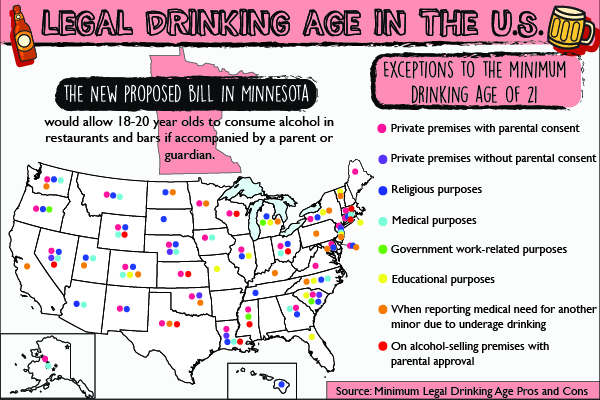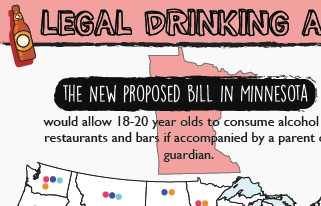
Rep. Phyllis Kahn has submitted two bills to the Minnesota legislature that, if passed, would lower the legal drinking age to 18 in bars and restaurants in Minnesota. The first bill would allow those 18 and older to order alcohol on their own in a bar or restaurant. The second would require a parent or guardian to be present for an underage adult to be able to order alcohol.
Kahn has submitted similar bills before and said they were dismissed partly due to the 1984 National Drinking Age Minimum Act, which threatened to withhold 10 percent of a state’s highway funding if it did not raise the drinking age to 21.
However, the recent 2012 Medicaid U.S. Supreme Court ruling could give the bills a greater chance at success, according to Kahn. The ruling states that the federal government cannot coerce states into expanding Medicaid by threatening to withhold federal funding. Kahn said she hopes to see this ruling expanded to work against the 1984 act.
“It’s the same philosophy, it’s just talking about a different amount of money,” Kahn said.
Sam Swanson, director of academic achievement at the School of Law, said it’s unclear whether this ruling will extend to the minimum drinking age act.
“It’s certainly plausible that that 10 percent would not apply anymore, but until you get a ruling on that, it might still apply, it might not,” Swanson said.
If the ruling does not apply to the National Drinking Age Minimum Act – meaning the state could lose the 10 percent of federal funding – Swanson said the Minnesota government will not lower the drinking age.
“That’s a lot of money; it’s a massive amount of money, which is the prohibiting factor,” Swanson said. “Minnesota is not going to forgo those federal funds. They’re simply not going to do it.”
Swanson said the 2012 ruling opens up the conversation to other factors besides money.
“The idea of the federal funding not necessarily pre-empting the discussion because I think it has really pre-empted the discussion so far,” he said. “It just allows it to have the discussion on the other matters.”
Junior Megan Garten, who is studying to become an alcohol and drug counselor, said it is a good idea to take money off the table and focus on other issues.
“You take the money aspect out of it and actually think about who is it going to benefit, who is it going to hurt, what impact is it going to have on the college kids, the high school kids,” Garten said.
For Kahn, these other matters include binge drinking, especially on college campuses. The National Institute on Alcohol Abuse and Alcoholism defines binge drinking as consuming enough alcohol to bring the blood alcohol concentration level to 0.08 within two hours. This typically means about four or five drinks. Kahn said if the bills were passed, they would allow people to learn safer drinking habits from a younger age.
“The idea is that if people were drinking in public, there’s control over it,” she said. “They’re much safer than people going either alone or in groups in a dorm room.”
Garten, on the other hand, said she does not support the bill, and she does not think it would make a difference in binge drinking on college campuses.
“It’s not going to solve anything,” she said. “You’re still going to have the fake IDs, you’re still going to have people who are trying to purchase alcohol, you’re still going to have people that pregame before they go to the bar.”
Kahn said she has more support for the bills this time than she has had in previous runs, though many supporters would prefer the drinking age to be lowered to 19 instead of 18 in order to prevent high school students from drinking.
Junior Alyssa Nelson said that although she is not opposed to a lower drinking age, she thinks 19 would be better.
“The only issue is people in high school who are 18 who could get into bars,” Nelson said. “Letting seniors in high school go to bars, you’re still young and stupid.”
Kahn said the most important way anyone can get involved, whether they are for or against the bills, is to contact their state legislator.
Rebecca Mariscal can be reached at mari2162@stthomas.edu.



